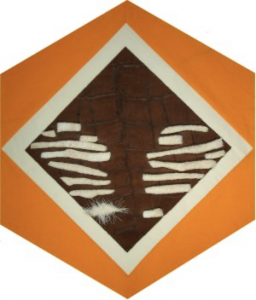Abenaki

The Block
A celebrated artist and singer, Sylvie Bernard executed this block design that she received in a dream. Native art is often inspired by dreams. It is a bold contemporary abstract design made in the traditional way. White, tufted deer hair, from the forehead of the deer, contrasts nicely with the soft embossed lambskin background.
Cultural Profile
Originally called Wabanaki, the Abenaki came to Quebec in the 17th century when they fled New England for political and religious reasons. Eventually, they settled in two villages along the banks of the St. Lawrence River, near Trois-Rivières. The towns of Odanak (meaning “welcome”) and Wolinak (“land of the rising sun”) are still home to about 400 of the 2,000 remaining Abenaki. The Abenaki community became a mixture of Aboriginal, French, and American heritage, which is reflected in their architecture, lifestyle and religion. They call themselves Alnanbal, meaning “men”; the Abenaki name itself comes from an Algonquin word meaning “People of the dawn” or “Easterners.”
They are a proud aboriginal people whose past is interwoven with Canada’s history. Strong allies of the French in early colonial days, the Abenaki fought against the British in the 1700s. Of particular distinction was a warrior named Assacumbuit, who was knighted by King Louis XIV of France for his bravery in battle. The Abenaki also defended Canada against American invasion during the War of 1812, and in the 20th century, many fought in both World Wars.
Typical of the Eastern Woodlands peoples, the Abenaki supplemented their hunting and gathering by growing corn, beans and squash. When spring arrived they tapped maple trees and boiled the sap to make maple syrup. The trees were tapped by inserting a twig, with the pith removed, into a gash cut into the bark of the tree. The sap would travel through the twig into a birchbark or clay bucket.
One of the main priorities in today’s Abenaki communities is the preservation of their culture and traditions. Skills, such as basketry, have been passed down along the generations and provide economic benefits. The Abenaki Museum, managed by the Odanak Historical Society, is one of the most important Native museums in Quebec.
Sponsor: Lafarge Canada Inc.
